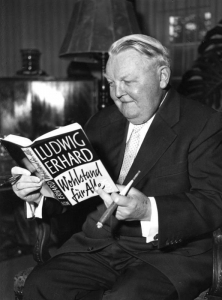Bob Hancké of the LSE examines the history of a dangerous idea – Ordoliberalism, or the belief that balanced budgets produce growth
At what was probably the most unpropitious moment in recent economic history to make the claim, US President Richard Nixon declared that we ‘are all Keynesians now’. In his view, the key problem of macroeconomic management, namely how to stabilise a modern economy, balancing growth (and employment) with inflation, was fundamentally resolved. Less than two years later, the advanced capitalist countries went into a tailspin, world economic growth stalled while both unemployment and inflation shot up.
Wolfgang Münchau, one of the more astute observers of European and German political economy in the Financial Times, recently wrote a column arguing that the strict fiscal policies of the new German Minister of Finance Olaf Scholz, a social democrat (!), will damage Germany’s partners in EMU. He calls it an accident to happen.
We did not have to wait long for the next instalment in what could, indeed, be a massive pile-up. The same day, the FT also reported that the French Finance Minister Gerald Darmanin is aiming for a zero deficit. Darmanin wants to restore France’s credibility in Europe. Some context might be useful: the last time France had a zero deficit or a budget surplus was sometime in the 1970s; and France is not really suffering from a poor credit rating, despite 40 years of deficits.
Sado-monetarism and Ordo-masochism
In any case, there seems to be a deeply masochistic streak running through the broad centre and centre-Left. It’s one thing for mathematically illiterate Right-wing parties such as the Tories in the UK to insist on fiscal discipline – they never really bought into the welfare state, and the ‘necessity’ of sorting out a crisis gives them the opportunity to make savage cuts that hit the poor and wage earners (while leaving the bankers alone).

But it’s a completely different thing for the Left and the progressive centre (as Macron and his acolytes like to see themselves) to blindly insist on austerity. Not only is it unnecessary: in both countries and in many other EMU member states the economy is stable and probably simply needs a few years of sustained growth to sort out the budgetary pressures. It is simply counterproductive if an economy is growing slowly, cutting demand is not a solution but exacerbates the problem.
At best, only well-organized, small, open economies could possibly save their way out of a slump by exporting more as a result of an ‘internal devaluation’ (see this paper by Vassilis Monastiriotis). But that only works if the large neighbour is willing to absorb the costs of that policy and if not too many others have discovered this strategy.
The generalised introduction of austerity as an economic adjustment path will therefore logically lead to a prolonged slump, making the problem worse. That is the core of Münchau’s accident waiting to happen.
The ideological foundation for such irrational masochistic economic policy is Ordo-liberalism. In essence, this economic doctrine says that once rules are agreed – and the scope and origins of the rules are pretty limited – then you should stick with them, regardless, because that is what increases the predictability of government policies. The problem with this line of thinking is that economies are inherently unpredictable. If we learnt one big thing from Keynes, it must be that the economy is not a system that tends toward stability; instead it is riddled with uncertainty, and that means that stabilising expectations in the light of new elements is the art of policy-making.
And the stricter the rules, as my colleague Jonathan White points out in a recent paper on the perverse effects of German Ordo-liberalism, the more you have to improvise when the unpredictable hits – as it inevitably will. Instead of less politics in the economy, you are likely to end up with more and more arbitrary, ‘unruly’ political interventions
If indeed, to paraphrase Nixon, ‘we are all Ordo-liberals now’, we can only hope that this is its swansong. It is a threat to the economy and to democracy.
Bob Hancké is an Associate Professor in the European Institute of the London School of Economics




